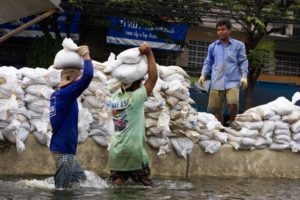Landmark IPCC report must be wake-up call for greater investment in disaster risk reduction

Following the release of the IPCC Working Group II Report on Impacts, Adaptation and Vulnerability, Mami Mizutori, Special Representative of the UN Secretary-General for Disaster Risk Reduction, issued the following statement:
The findings of the latest IPCC report are dire. Communities around the world are being affected by climate change at a magnitude worse than expected. The devastating impacts of climate disasters are affecting every part of the world.
As the UN Secretary-General António Guterres said today “The IPCC report is an atlas of human suffering and a damning indictment of failed climate leadership.”
Many of the changes are at risk of becoming irreversible. On our current trajectory, the world is set to breach the 1.5 °C safe global temperature limit by the early 2030s, spiralling to dangerous levels of disaster risk. Almost half the human population is already in the danger zone
It is incomprehensible that we knowingly continue to sow the seeds of our own destruction, despite the science and evidence that we are turning our only home into an uninhabitable hell for millions of people.
Based on current trends, a record increase in medium and large-scale disasters is expected with droughts doubling, and extreme temperature events almost tripling to 2030. Overall, disaster events have doubled in the last 20 years compared to the previous 20 years. If countries and governments do not manage it properly and respond to the climate emergency with urgency, there’s a very real chance that we’ll see them double again.
Yet the world also has an opportunity to meet these challenges. At the Global Platform for Disaster Risk Reduction in Bali, Indonesia this May, organised by the UN and hosted by Indonesia, leaders will gather to discuss how to accelerate action for reducing these risks.
The IPCC report points to many solutions on improving regional and local information, providing sound data and knowledge for decision makers. This does work. Countries have succeeded in saving many lives through improved early warning systems and preparedness.
But climate disasters will undoubtedly worsen. There are very low levels of investments in disaster prevention and disaster risk reduction for the world’s most vulnerable countries on the front lines of impacts. We need to ramp up investment in disaster prevention if we are to cope with the exponential rise of disaster events in recent decades.
A crucial recommendation in the report today is the need for climate-resilient development – inclusive governance that embeds finance and actions across governance levels, sectors and timeframes.
Furthermore, all countries are impacted by climate change, but not in the same way. The most vulnerable communities and nations are the hardest hit, and need greater support on climate finance to adaptation and to avert, minimize and address losses and damages. This means increasing financing for climate change adaptation from tens to hundreds of million dollars.
We need to ensure that regulations and funding take into account disaster risk and that climate risk in financial markets is disclosed. Governments need to make disaster resilience a priority through dedicated funding to prevention.

